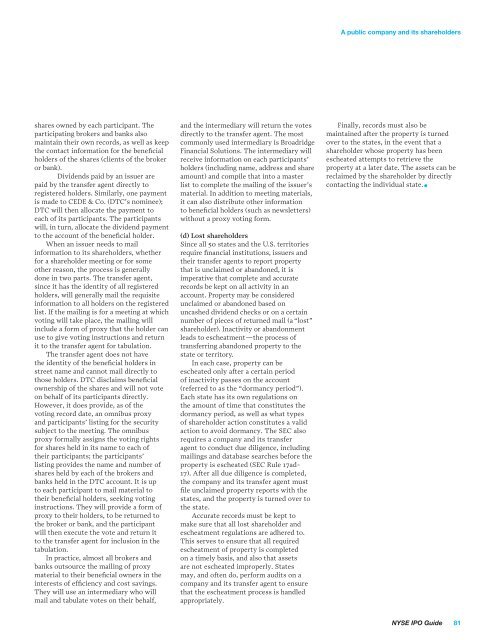xavGE
xavGE
xavGE
Create successful ePaper yourself
Turn your PDF publications into a flip-book with our unique Google optimized e-Paper software.
A public company and its shareholders<br />
shares owned by each participant. The<br />
participating brokers and banks also<br />
maintain their own records, as well as keep<br />
the contact information for the beneficial<br />
holders of the shares (clients of the broker<br />
or bank).<br />
Dividends paid by an issuer are<br />
paid by the transfer agent directly to<br />
registered holders. Similarly, one payment<br />
is made to CEDE & Co. (DTC’s nominee);<br />
DTC will then allocate the payment to<br />
each of its participants. The participants<br />
will, in turn, allocate the dividend payment<br />
to the account of the beneficial holder.<br />
When an issuer needs to mail<br />
information to its shareholders, whether<br />
for a shareholder meeting or for some<br />
other reason, the process is generally<br />
done in two parts. The transfer agent,<br />
since it has the identity of all registered<br />
holders, will generally mail the requisite<br />
information to all holders on the registered<br />
list. If the mailing is for a meeting at which<br />
voting will take place, the mailing will<br />
include a form of proxy that the holder can<br />
use to give voting instructions and return<br />
it to the transfer agent for tabulation.<br />
The transfer agent does not have<br />
the identity of the beneficial holders in<br />
street name and cannot mail directly to<br />
those holders. DTC disclaims beneficial<br />
ownership of the shares and will not vote<br />
on behalf of its participants directly.<br />
However, it does provide, as of the<br />
voting record date, an omnibus proxy<br />
and participants’ listing for the security<br />
subject to the meeting. The omnibus<br />
proxy formally assigns the voting rights<br />
for shares held in its name to each of<br />
their participants; the participants’<br />
listing provides the name and number of<br />
shares held by each of the brokers and<br />
banks held in the DTC account. It is up<br />
to each participant to mail material to<br />
their beneficial holders, seeking voting<br />
instructions. They will provide a form of<br />
proxy to their holders, to be returned to<br />
the broker or bank, and the participant<br />
will then execute the vote and return it<br />
to the transfer agent for inclusion in the<br />
tabulation.<br />
In practice, almost all brokers and<br />
banks outsource the mailing of proxy<br />
material to their beneficial owners in the<br />
interests of efficiency and cost savings.<br />
They will use an intermediary who will<br />
mail and tabulate votes on their behalf,<br />
and the intermediary will return the votes<br />
directly to the transfer agent. The most<br />
commonly used intermediary is Broadridge<br />
Financial Solutions. The intermediary will<br />
receive information on each participants’<br />
holders (including name, address and share<br />
amount) and compile that into a master<br />
list to complete the mailing of the issuer’s<br />
material. In addition to meeting materials,<br />
it can also distribute other information<br />
to beneficial holders (such as newsletters)<br />
without a proxy voting form.<br />
(d) Lost shareholders<br />
Since all 50 states and the U.S. territories<br />
require financial institutions, issuers and<br />
their transfer agents to report property<br />
that is unclaimed or abandoned, it is<br />
imperative that complete and accurate<br />
records be kept on all activity in an<br />
account. Property may be considered<br />
unclaimed or abandoned based on<br />
uncashed dividend checks or on a certain<br />
number of pieces of returned mail (a “lost”<br />
shareholder). Inactivity or abandonment<br />
leads to escheatment—the process of<br />
transferring abandoned property to the<br />
state or territory.<br />
In each case, property can be<br />
escheated only after a certain period<br />
of inactivity passes on the account<br />
(referred to as the “dormancy period”).<br />
Each state has its own regulations on<br />
the amount of time that constitutes the<br />
dormancy period, as well as what types<br />
of shareholder action constitutes a valid<br />
action to avoid dormancy. The SEC also<br />
requires a company and its transfer<br />
agent to conduct due diligence, including<br />
mailings and database searches before the<br />
property is escheated (SEC Rule 17ad-<br />
17). After all due diligence is completed,<br />
the company and its transfer agent must<br />
file unclaimed property reports with the<br />
states, and the property is turned over to<br />
the state.<br />
Accurate records must be kept to<br />
make sure that all lost shareholder and<br />
escheatment regulations are adhered to.<br />
This serves to ensure that all required<br />
escheatment of property is completed<br />
on a timely basis, and also that assets<br />
are not escheated improperly. States<br />
may, and often do, perform audits on a<br />
company and its transfer agent to ensure<br />
that the escheatment process is handled<br />
appropriately.<br />
Finally, records must also be<br />
maintained after the property is turned<br />
over to the states, in the event that a<br />
shareholder whose property has been<br />
escheated attempts to retrieve the<br />
property at a later date. The assets can be<br />
reclaimed by the shareholder by directly<br />
contacting the individual state. ●<br />
NYSE IPO Guide<br />
81



